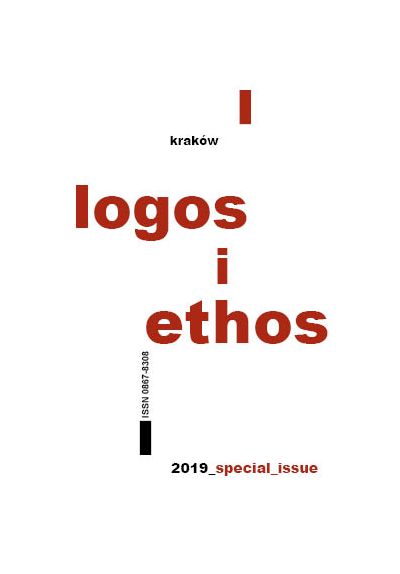Deformations of conscience
DOI:
https://doi.org/10.15633/lie.3471Keywords:
Dietrich von Hildebrand, pseudonorms, legalism, anarchism, extramoral theories, extramoral ideologies, moral values, extramoral values, value response, reverent humbleloving center, concupiscent center, pride centerAbstract
The paper presents a description of moral pseudonorms, which displace proper moral norms from our consciousness and action as well as distort our morality. The study analyzes mainly the pseudonorms that generate the fundamentals of legalism and their opposition – the fundamentals of moral anarchism. The first groups of pseudonorms identifies morality with civil law, especially criminal law. On the other hand the other group of pseudonorms, equates morality with what is spontaneous, impulsive, authentic.
The paper analyzes not only the scope and contentrelated distortion of moral norms caused by the substitutes of morality, but it also reveals the reasons of creating the pseudo norms in our consciousness. These reasons are induced by the impact of the pride center and the concupiscent center on our value response and by preferring the extramoral values over the moral ones. Exposing the mechanism of functioning of the pseudonorms in our moral consciousness is useful not only for ethics but also for psychology and pedagogy as well as for selfeducation and moral development.
References
Biesaga T., Dietricha von Hildebranda epistemologiczno‑ontologiczne podstawy etyki, Lublin 1989.
Biesaga T., Emocjonalna odpowiedź na wartość u podstaw życia moralnego, [in:] Konteksty podmiotowej świadomości, ed. E. Podrez, R. Moń, Olecko 2003 (Episteme, 29), pp. 91–100.
Biesaga T., Spór o normę moralności, Kraków 1998.
Biesaga T., Świadomościowe i osobowe warunki odpowiedzialności, [in:] O odpowiedzialności. Moralny wymiar odpowiedzialności w życiu publicznym, ed. J. Pawlica, Kraków 1993, pp. 67–74; and [in:] „Studia Philosophiae Christianae” 29 (1993) no. 2, pp. 27–37.
Dąbrowski K., Osobowość i jej kształtowanie poprzez dezintegrację pozytywną, Lublin 1984.
Fenomen sumienia, ed. D. Adamczyk, Kielce 2012.
Gorczyca J., Dietricha von Hildebranda koncepcja poznania wartości moralnych, „Analecta Cracoviensia” 19 (1987), pp. 427–439.
Hildebrand D. von, Christian Ethics, New York 1952; German Edition Ethik, Regensburg 1973 (Gesammelte Werke, 2).
Hildebrand D. von, Fundamentalne postawy moralne, trans. K. Meissner OSB, [in:] Wobec wartości, Kraków 1984, pp. 11–54.
Hildebrand D. von, Graven Images: Substitutes for True Morality, New York 1957; German Edition, Substitute für wahre Sittlichkeit, [in:] Idolkult und Gotteskult, Regensburg 1974, pp. 13–190 (Gesammelte Werke, 7).
Hildebrand D. von, Liturgie und Pesönlichkeit, [in:] Idolkult und Gotteskult, Regensburg 1974, pp. 191–300 (Gesammelte Werke, 7).
Hildebrand D. von, Przemienienie w Chrystusie, trans. J. Zychowicz, Kraków 1982.
Hildebrand D. von, Hildebrand A. von, The Art of Living, Chicago 1965.
Kurtek P., Lasota A., Wybrane psychologiczne aspekty struktury i rozwoju sumienia, [in:] Fenomen sumienia, ed. D. Adamczyk, Kielce 2012, pp. 53–70.
Murawski K., Jaźń i sumienie. Filozoficzne zagadnienia rozwoju duchowego człowieka w pracach Carla Gustawa Junga i Antoniego Kępińskiego, Wrocław 1987.
Stach R., Sumienie i mózg. O wewnętrznym regulatorze zachowań moralnych, Kraków 2012.
Wiśniewska D., Rodzaje i rola substytutów w moralności w ujęciu Dietricha von Hildebranda, „Logos i Ethos” 2014 no. 2 (37), pp. 77–98.
Downloads
Published
Issue
Section
License
Copyright (c) 2020 Tadeusz Biesaga

This work is licensed under a Creative Commons Attribution 4.0 International License.
The following rules apply to copyright:
1. The author declares that he or she has full copyright to the work, and such copyright it is not limited to the extent applicable to this declaration, that the article is an original work and that it does not infringe any third-party rights.
2. The author agrees to a free-of-charge, non-exclusive and non-restricted use of the work by Pontifical University of John Paul II in Krakow i.e.:
- to record and duplicate: make copies of the work by means of printing, reprography, magnetic or digital storage;
- to circulate the original or the copies of the work (disseminate, lend or lease the original or copies thereof, publicly display, screen or make the work publicly available so that everyone is able to access it at the time and in place they wish to do so);
- to include the work in a compilation;
- the Pontifical University of John Paul II in Krakow may grant sublicenses Creative Commons Acknowledgement of authorship-Non-commercial use-Without derivative work 3.0 Poland
- the author and the title of the work will be listed,
- the place of publication (name of the periodical and an Internet link to the originally published work),
- the work will be distributed in a non-commercial way,
- no derivative works will be created.
The UPJPII Press does not waive any of its copyrights to any target group.
If you want to publish the text in Logos and Ethos, you must sign the license. However, the signing takes place at a later stage of publishing. Check the license: [license_en.pdf]

